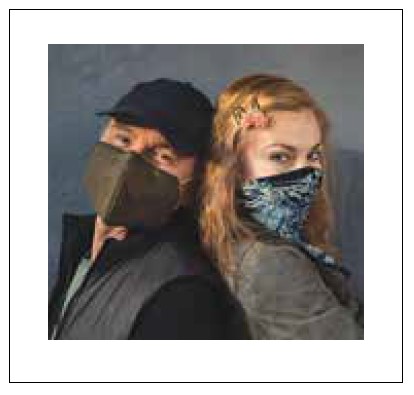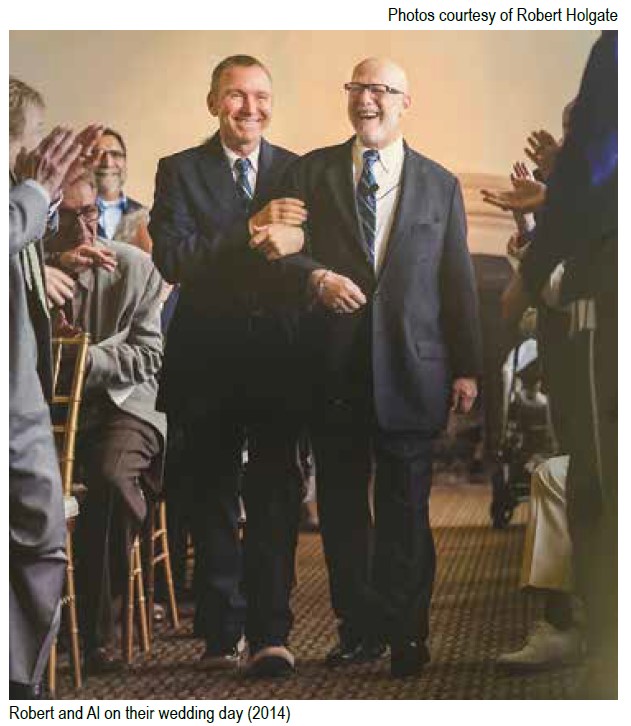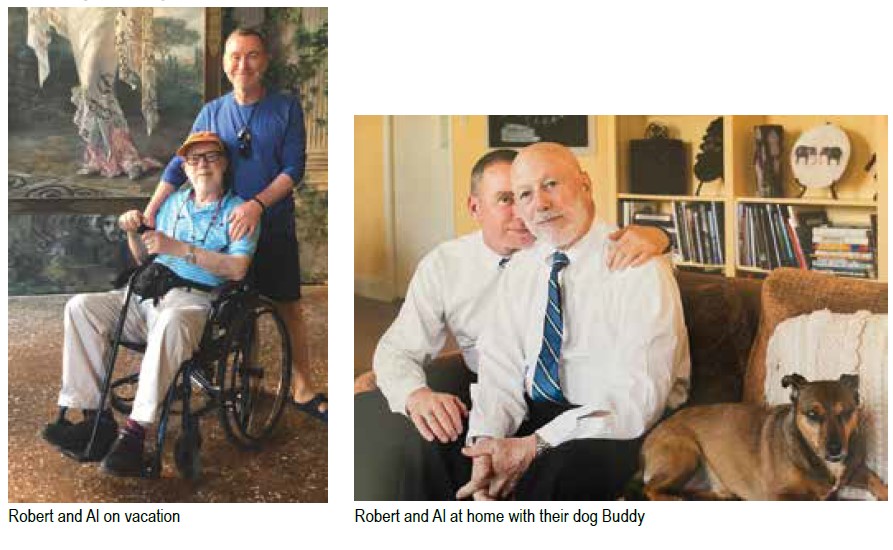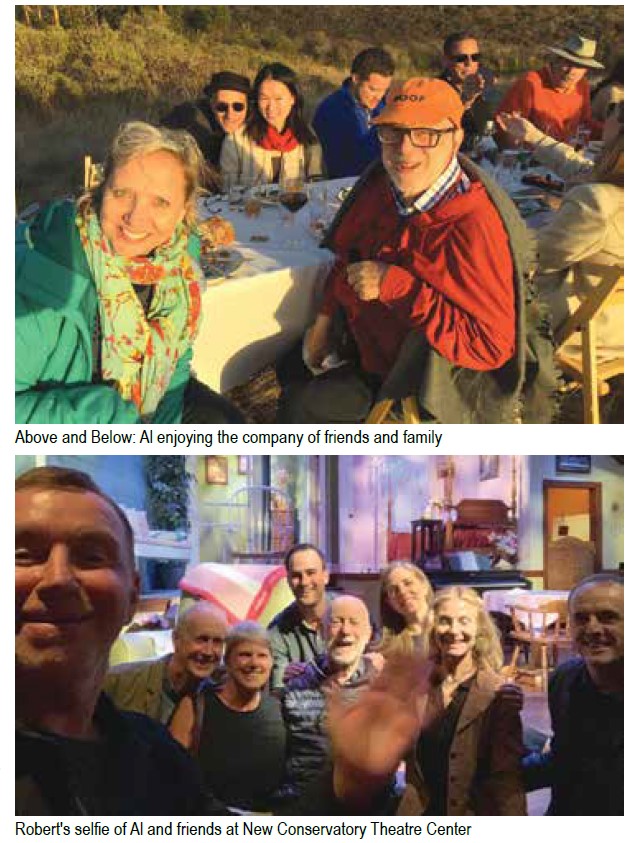
By Jennifer Kroot–
On March 28th, philanthropist Al Baum passed away at home. His husband Robert Holgate was by his side, along with dear friends Brigette Scheel and Steve Shimmon. Robert is my writing partner for this column, and longtime friend.
Just before the pandemic, Robert and Al took me and my partner to dinner and the theatre. We went to Zuni, which was Al’s favorite, and, of course, we had the famous Zuni chicken, also Al’s favorite. Then we went to The New Conservatory Theatre Center—which Al and Robert have supported for many years. We saw Head Over Heels, the Go-Go’s musical. It was a magical evening, and the last time we saw Al.

I sat with Robert in the living room that he and Al designed together. Amidst laughs and tears, Robert reminisced about his life with Al.
JK: How did you meet?
RH: In 2004, our mutual friend, Joe Gillach, mentioned that he’d referred me to a wonderful man, Al Baum, who was looking for an interior designer. Joe said, “Don’t be afraid of him. He’s cheap as hell, and he has more money than God, but you’ll love working with him.” The way that Al told the story was that in five minutes he knew he wanted to work with me. Then in five weeks he knew he was in love with me. Then, it was five months before I succumbed.
But, I say, it was when we finished our project, because I didn’t mix business with pleasure, which drove him crazy!
JK: How long have you been together?
RH: We were together 10 years before we got married, and we’ve been married seven years. We had a small wedding in February, 2014, officiated by former CA State Senator Mark Leno, whom we admired and supported over the years. We had a big wedding in the Presidio in May. I had a Buddhist minister, and Al had a rabbi.
JK: So, Al was an extrovert and you’re an introvert?
RH: Yeah. In my work, I’ve had to sell stuff, and so, I had to be good with people and communication. It was never easy for me. I did it for survival. Al, on the other hand, was just a natural. He would get invites to all kinds of events, and would never miss one. He’d literally do four or five events in a day, and ride this little red scooter, because he could park right in front of all of the events. He’d go in for 20 minutes, then zip off to the next event.
Well, we’d been together a few years, and Al was at least 75, and I noticed a huge bruise down the side of his body. I said, “Al, what happened?” and he said, “Nothing.” I said, “B.S., what happened?” He finally told me that when racing from one event to the next, he’d fallen off of his scooter, and slid across Market Street! I said, “That’s it. You’re getting rid of the scooter.” He wasn’t happy, but he realized that it was time.

JK: When did Al come to San Francisco?
RH: Ten days after I was born, on January 14th, 1958. I was born on January 4th. Al was 28.
JK: Is it hard when you’re in an intergenerational relationship to have to make rules like taking the scooter away?
RH: Yes. It was never easy. Years after the scooter, we argued about hearing aids. Oh, my god, did we have a fight about that! Years later he had to stop driving. The next was the walker, and then the wheelchair. He wanted to be self-reliant, but couldn’t be anymore.
It really wasn’t in his nature to let go. I was always so proud of him when he could, and even during the week when he passed. It had been a really hard couple of months, and he finally just let go.
RH: May I go on a tangent here?
JK: Sure!
RH: Nobody ever called Al out on anything. Everybody just went along with him, and for good reason, for the most part. He was a brilliant man. But there were some quirky, sometimes insensitive, things he would say that were not always okay. Remember, he was born in 1930, so he was from a different time.
Anyway, I started calling him on it. Eventually, we both laughed about it. We even joked about the fact that the only reason we lasted as long as we did was because he knew that I would stand up to him when he was insensitive.
The last thing Al told the rabbi before he passed was that I made him a better person. I think Al realized he didn’t have to feel like he controlled everything.
And I learned so much from Al. His warmth and generosity were contagious and inspiring.

JK: So, you’ve confided that this year with COVID-19 was pretty tough for Al. What was it like for him?
RH: Like so many people, he felt trapped. He turned 90 in September and he’d planned to have a huge party, but that wasn’t possible. He was also hoping to officiate his second cousin’s wedding, but that was postponed.
I took him on drives a lot. That cheered him up. He loved geography and architecture. We’d wander and look at buildings. When we saw one in disrepair I’d say, “What would you do to make that one look better?” He always had the same answer: “I’d put shutters on it.” Didn’t matter if it was Victorian or modern.
JK: You mentioned you wanted to talk about Al’s caretaker.
RH: Yes. Eric has been with us for over six years He truly loved Al.
The most beautiful thing happened after Al died. Eric and I sat on the bed with Al and we decided to pick out a wonderful outfit for Al, so when he left the house to be cremated, he’d be in something that he loved. Eric made sure that his buttons were lined up, and that everything was right; not a belt loop was missed. He had socks on that had pictures of our dog Buddy, who had died in February 2020. He wore his favorite slippers. The finishing touch was a strand of beads that we’d bought in Africa.
Al would’ve loved the outfit.
Jennifer Kroot is a filmmaker, known for her award-winning LGBTQ themed documentaries, including “The Untold Tales of Armistead Maupin” and “To Be Takei.” She studied filmmaking at the San Francisco Art Institute, where she has also taught. She is a member of The Academy of Motion Picture Arts and Sciences.
A humanitarian, as well as a designer, Robert Holgate is dedicated to critical social issues. With his hands-on approach to philanthropy and social justice, he supports the advancement of local and national social causes. For more information: https://www.rhdsf.com/

Jewish tradition tells us that at any given time there are 36 righteous individuals among us who by their goodness keep the world going. For several decades, Al Baum was such an indispensable human for San Francisco, and, of course, especially our LGBTQ and Jewish communities. He was one of our leading philanthropists for a host of worthy charitable endeavors and political campaigns. He was also a sweet, sweet man and a dear friend. I will miss him very much, and extend my deepest condolences to his husband Robert and all those who loved Al and mourn his loss (a long list indeed). May his memory be for a blessing.
—Supervisor Raphael Mandelman

Al Baum was generosity incarnate. He took extraordinary joy in giving, and gave not only generously but also consistently, investing in LGBTQ and other nonprofits for the long run. Al understood what it takes to build strong organizations, and that strong organizations form the backbone of our community. While Al was never showy, what he—together with Robert for the last 15 years or more—did do was to show up, again and again and again. And there’s so much he did beyond donating money: Al became a source of wisdom, support, and insight to countless community leaders.
Al Baum loved San Francisco, and he simply loved the LGBTQ community. He has left a profound mark—the evidence is everywhere. And perhaps his very greatest contribution—his greatest gift—was the inspiration he provided to thousands of others. Through them and through his own enormous gifts, Al Baum will keep making life better for LGBTQ people for generations to come.
—Roger Doughty, President of Horizons Foundation
Published on April 8, 2021
Recent Comments